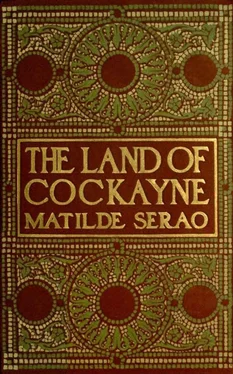Matilde Serao - The Land of Cockayne
Здесь есть возможность читать онлайн «Matilde Serao - The Land of Cockayne» — ознакомительный отрывок электронной книги совершенно бесплатно, а после прочтения отрывка купить полную версию. В некоторых случаях можно слушать аудио, скачать через торрент в формате fb2 и присутствует краткое содержание. Жанр: unrecognised, на английском языке. Описание произведения, (предисловие) а так же отзывы посетителей доступны на портале библиотеки ЛибКат.
- Название:The Land of Cockayne
- Автор:
- Жанр:
- Год:неизвестен
- ISBN:нет данных
- Рейтинг книги:3 / 5. Голосов: 1
-
Избранное:Добавить в избранное
- Отзывы:
-
Ваша оценка:
- 60
- 1
- 2
- 3
- 4
- 5
The Land of Cockayne: краткое содержание, описание и аннотация
Предлагаем к чтению аннотацию, описание, краткое содержание или предисловие (зависит от того, что написал сам автор книги «The Land of Cockayne»). Если вы не нашли необходимую информацию о книге — напишите в комментариях, мы постараемся отыскать её.
The Land of Cockayne — читать онлайн ознакомительный отрывок
Ниже представлен текст книги, разбитый по страницам. Система сохранения места последней прочитанной страницы, позволяет с удобством читать онлайн бесплатно книгу «The Land of Cockayne», без необходимости каждый раз заново искать на чём Вы остановились. Поставьте закладку, и сможете в любой момент перейти на страницу, на которой закончили чтение.
Интервал:
Закладка:
'When do you get your week's money?'
'Eh!' he said, shrugging his shoulders—'generally on Fridays: I have nothing to get.'
'How do you manage to gamble?'
'One can always get it for gambling. Donna Caterina's sister—she of the small game—lends money.'
'Does she take big interest?'
'A sou for each franc every week.'
'Not bad—not bad,' said the shoeblack, with a convinced look.
'I have seventy-five francs to give her,' said the glove-cutter. 'Every Monday there is a storm. She waits for me outside the factory door, shouting and swearing. She is really a witch, Michele. But what can I do? One day or other I will take a terno, and I will pay her.'
'What will you do with the rest of your winnings?' Michele asked, laughing.
'I know what I will do,' cried Gaetano, the cutter. 'In new clothes, a pheasant's feather in my cap, in a carriage with bells, we will all go to amuse ourselves at the Due Pulcinelli, at Campo di Marte.'
'Or at Figlio di Pietro, at Posellipo.'
'At Asso di coppe, at Portici.'
'Inn after inn.'
'Meat and macaroni.'
'And Monte di Procida wine.'
'Just so, one only lives once,' the glove-cutter philosophically concluded, pulling his jacket up on his shoulder.
'I don't get into debt,' the shoeblack added, after a minute's silence.
'Lucky you!'
'I would get no one to lend me a sou, anyhow. But I play everything. I have no family; I can do what I like.'
'Lucky you!' Gaetano repeated, with a troubled look.
'Three sous for a sleeping-place, five or six for food,' went on the shoeblack, 'and who says a word to me? I did not want to marry; I had a rage for gambling: it stands in place of everything.'
'May he that invented marriage be hanged!' blasphemed Gaetano, getting clay colour.
Four o'clock was approaching, and the Impresa court filled up with people. In that space of a hundred metres was a crowd of common people pressed together, chattering in a lively way or waiting in resigned silence, looking up to the first-floor at the covered balcony, where the lottery drawing was to come off. But all was shut up above, even the wooden shutters, behind the glass of the great balcony. As other people came up continually, the crowd reached to the wall of the court even. Women that were pushed back had squatted on the first steps of the stair; others, more bashful, hid under the balcony among the pillars that held it up, leaning against a shut stable door. Another woman, still young, but with a pallid, worn, fascinating face, rather strange, melancholy black eyes, hollow-rimmed, and thick black locks loose on her neck, had climbed on a stone left in the courtyard, perhaps from the time the palace was built or restored. She looked very thin in her dyed black gown, that went in folds over her lean breast; she was swinging one foot in a broken, out-at-heel shoe, pulling up on her shoulders now and then a wretched little shawl, dyed also. She overlooked the crowd, gazing at it with downcast, sad eyes. It was almost entirely composed of poor people—cobblers who had shut up their bench in the dens they lived in, had rolled their leather aprons round their waists: in shirt-sleeves, cap over the eyes, they pondered in their minds the numbers they had played, slightly moving their lips; servants out of place, who, instead of trying for a master, used up the last shilling from the pawned winter coat, dreaming of the terno that from servants would make them into masters, whilst an impatient frown crossed the gray faces, where the beard, no longer shaven, grew in patches. There were hackney coachmen, who had left their cab in the care of a friend, brother, or son, waiting patiently, hands in pocket, with the stolidity of a cabman used to waiting hours for a hire; there were letters of furnished rooms, hirers of servants, who in summer, with all the strangers and students gone, sat pining in their chairs under the board that forms their whole shop, at the corners of San Sepolcro Lane, Taverna Penta, Trinità degli Spagnuoli; having played a few sous taken from their daily bread, they came to hear the lottery drawn, being unemployed—and lazy. There were hands at humble Neapolitan trades, who, leaving the factory, warehouse, or shop, giving up their hard, badly-paid work, clutching in their worn-out waistcoat pocket the five sous ticket, or bundle of numbers at the little game, had come to pant over that dream that might become a reality. There were still more unlucky people—that is to say, all those who in Naples do not live by the day even, but by the hour, trying a hundred trades, good at all, but unable, unluckily, to find safe remunerative work; unfortunates without home or shelter, shamefully torn and dirty, they had given up their bread that day to play a throw. One read in their faces the double marks of fasting and extreme abasement.
Some women were noticeable among the crowd—slovenly women, of no particular age, nor beauty; servants out of place, desperate gamblers' wives, who gambled themselves, dismissed workwomen, and among them all Carmela's pale, fascinating face, the girl seated on the stone—a faded face with big, tired eyes. Later on, as the hour for the drawing got near, and the noise increased, among the few gray women's faces and torn calico dresses, discoloured from too frequent washings, quite a different woman's face showed. She was a tall, strong woman of the lower class, with a high-coloured dark face; her chestnut hair was drawn back, elaborately dressed—the fringe on her narrow forehead had even a touch of powder; and heavy earrings of uneven, round, greeny-white pearls pulled down her ears, so that she had had to secure them by a black silk string, fearing they would break the lobes; a gold necklace and a thick gold medallion hung over the white muslin vest, all embroidered and tucked with lace. She pulled up a transparent black silk crape shawl on her shoulders every now and then, to show her hands, which were covered with thick gold rings up to the second joint. Her eye was grave and quiet, with a slight look of quiet audacity, her mouth settled and severe; but on going through the crowd, on her way to sit on the third step of the stair, to see and hear better, she kept that bend of the head, rather coquettish and mysterious, peculiar to the Neapolitan lower class, and the swaying of her body under the shawl that a Naples woman dressed in the French fashion soon loses. Still, in spite of the natural sympathy that womanly figure inspired among the crowd, there was almost a hostile murmur and something like an indignant movement. She shrugged her shoulders disdainfully, and sat alone, upright, on the third step, keeping the shawl up on her shoulders, her ring-laden hands crossed in front. The murmur went on here and there. She looked at the crowd severely twice or thrice—rather proudly. The voices ceased; the woman's eyelids fluttered, as if from gratified pride.
But, finally, over all the others—over Carmela, with her faded face and great sad eyes; over Donna Concetta, with her ringed fingers and powdered fringe, the handsome, healthy, rich Concetta, the usurer, sister to Donna Caterina, the holder of the small game—above the crowd in the court, entrance, and street, a woman's form stood out, drawing at least one look from the people gathered together. It was the woman on the first-floor of the Impresa Palace, sitting sideways behind the balcony railings; one saw her profile bending over the bright steel fittings of a Singer sewing-machine, lifting her head now and then, whilst her foot, coming from under a modest blue-and-white striped petticoat, beat evenly on the iron pedal, regularly rising and falling. Among the stir of voices, the conversations from one end of the court to the other, and stamping of feet, the dull quaver of the sewing-machine was lost; but the seamstress's figure stood out in profile on the balcony's gloomy background, her hands pushing the bit of white linen under the machine needle, her foot untiringly beating the pedal, her head rising and bending over her work, with no ardour, but no weariness, evenly on. A thin, rather pink cheek was shown in profile, and a thick chestnut tress neatly arranged close to the nape of the neck, the corner of a fine mouth, and the shade of long eyelashes thrown on the cheeks, could also be seen. During the hour the crowd was pouring into the court, the young seamstress had not looked down twice, giving a short indifferent glance and lowering her head again, taking the piece of linen slowly along in her hands, so that the seam should be quite straight. Nothing distracted her from her work—neither angry voice or lively remarks, nor the noise or the increasing trampling of the crowd; she had never looked at the covered balcony, where in a short time the drawings would be called out. The people from below stared at the delicate, industrious white sewer, but she went on with her work as if not even an echo of that half-covered, half-open excitement came up to her; she seemed so far off, so reserved, so wrapped up in a quite detached, different world, that one could fancy her more a statue than a reality—more of an ideal figure than a living woman.
Читать дальшеИнтервал:
Закладка:
Похожие книги на «The Land of Cockayne»
Представляем Вашему вниманию похожие книги на «The Land of Cockayne» списком для выбора. Мы отобрали схожую по названию и смыслу литературу в надежде предоставить читателям больше вариантов отыскать новые, интересные, ещё непрочитанные произведения.
Обсуждение, отзывы о книге «The Land of Cockayne» и просто собственные мнения читателей. Оставьте ваши комментарии, напишите, что Вы думаете о произведении, его смысле или главных героях. Укажите что конкретно понравилось, а что нет, и почему Вы так считаете.












